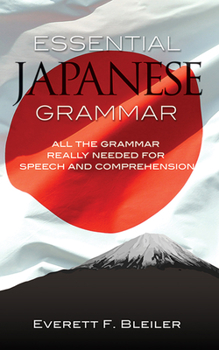Essential Japanese Grammar
Select Format
Select Condition 
Book Overview
Although not a member of the Indo-European language family, Japanese is not too difficult grammatically for an English speaker. It is astonishingly regular in its formations -- exceptions and irregularities can usually be numbered on one's fingers -- and once the student masters a few conventions of linguistic classifications of experience, he will find that he can express most of his wants. This is the first Japanese grammar written for the adult with a limited objective in studying Japanese: to express oneself orally with reasonable accuracy; to understand simple material addressed to oneself; and to be able to analyze, understand, and enlarge material in a phrase approach. The author has limited this book to modern colloquial Japanese, and does not overburden the student with literary language, rarely used alternate forms, unnecessary abrupt forms, causatives and direct conditionals, and similar forms that might be required for a full knowledge of the written language. On the other hand, this book is not simplified Japanese, nor baby Japanese, nor kitchen Japanese. It is the full idiomatic language, with thorough treatments of the material you really need: the noun, pronoun, adjective, demonstrative words, adverb, verb, negative forms, Chinese forms, courtesy and honorific forms, idiomatic constructions, word order, relationship of ideas, syntax, etc. Emphasis has been placed upon clarity of exposition, so that the English-speaking reader can understand what is really happening in Japanese, even if he has never studied any foreign language before. For this reason, explanation rather than brute memory work is stressed, examples are given for all constructions, and both word-for-word and free translations are given, to acquaint the reader with thought processes. Hints are given on avoiding difficult constructions. Japanese is presented in the Romaji transliteration, which can be read at sight. Characters are not used.
Format:Paperback
Language:English
ISBN:0486210278
ISBN13:9780486210278
Release Date:June 1963
Publisher:Dover Publications
Length:156 Pages
Weight:0.25 lbs.
Dimensions:0.4" x 5.4" x 8.0"
Customer Reviews
3 ratings
Excellent analyses !
Published by Thriftbooks.com User , 17 years ago
This book gives brief, but excellent analyses of Japanese grammar with great analogy as well as insightful comparison between Japanese and English.
Good little grammar for my purposes
Published by Thriftbooks.com User , 21 years ago
My interest is in comparative and structural linguistics rather than in learning to speak, so I didn't mind that this is now a fairly old book and some of the information on current usage is dated. I'm not interested in speaking it so much as understanding a little more about how an Altaic family language works in more detail, as I already have a pretty good grasp of Han Chinese, Germanic, Slavic, and the Romance family grammars and patterns. And for that purpose this book was fine. For example, I learned that Japanese does not have a true future tense--you have to use a version of the present progressive for that--very interesting. In fact, Japanese has none of the complexity that Indo-European family languages show with respect to the handling of time and temporal relationships. However, it is much more complex in the area of modal or mood constructions, which signify a speaker's attitude toward the object, necessity, or probability. Japanese verbs are very regular and are not conjugated for person or number as in many languages, and the few irregular verbs can be counted on the fingers of one hand. What a dream--if only Spanish, Latin, Russian, and French were like that. In that regard, it's very similar to English--as well as Chinese. Another interesting area where Japanese differs radically from our pattern is that adjectives are conjugated to agree with the verb, rather than declined to agree with the noun, unlike English and the other Indo-European languages, and Semitic family languages like Arabic as well. For example, in Japanese you would say, "That sounds interestingly," for which in English you would say, "That sounds interesting," with the word "interesting" simply being a subjective complement rather than an adjective being treated like an adverb. But in Japanese the adjective agrees with the verb rather than the noun. Go figure. So overall, this was a nice introduction to the subject that filled a gap in my own background.By the way, in the last 20 years, since I was first studying linguistics, there has been considerable advance in the understanding of Ural-Altaic family languages and their relationships, and there are several good websites that have information on that. So if you're like me and want to pursue the subject further and don't have access to a fine linguistic library like at U.C. Berkeley or Indiana State University at Bloomington, you can find some of that on the web now.
Great Introduction - will get you around country.
Published by Thriftbooks.com User , 22 years ago
This book was my best tool for learning Japanese. I recommend getting the course with CDs or tapes if you can. This course will introduce you to most common words and phrases you will need, and you will need to apply yourself. I lived in Japan for about 7 years on and off. Japanese is a tough language. I was not fluant, but I had no problem tavelling without an english enterpreter, and I constantly received complements on my accent.I recomend the 'Essential Language' courses for any language.






